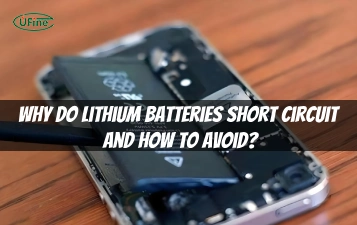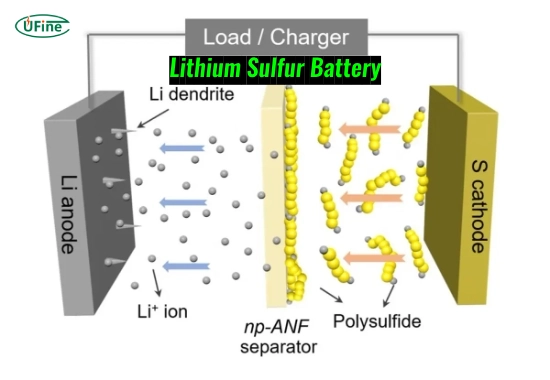
- Part 1. What is a lithium sulfur battery?
- Part 2. What is a lithium silicon battery?
- Part 3. How do lithium sulfur batteries differ from lithium silicon batteries?
- Part 4. Why is energy density critical in batteries?
- Part 5. What are the challenges of lithium sulfur batteries?
- Part 6. What are the challenges of lithium silicon batteries?
- Part 7. Which battery is better for electric vehicles?
- Part 8. Are lithium sulfur batteries more sustainable?
- Part 9. What industries will benefit most from these batteries?
- Part 10. Future potential of lithium sulfur and lithium silicon batteries
- Part 11. FAQs
The world of battery technology is evolving rapidly, with new advancements aimed at improving energy storage, efficiency, and sustainability. Among the most promising contenders are lithium sulfur batteries and lithium silicon batteries. These cutting-edge technologies are being explored for applications ranging from electric vehicles to consumer electronics and renewable energy systems. But what sets them apart? This article will dive deep into the differences, benefits, and limitations of these two battery types. Whether you’re a tech enthusiast or a professional in the energy sector, this guide will equip you with the knowledge to understand the nuances of lithium sulfur versus lithium silicon batteries.
Part 1. What is a lithium sulfur battery?
A lithium sulfur (Li-S) battery is a type of rechargeable battery that uses sulfur as its cathode material and lithium as its anode. The battery operates through electrochemical reactions between lithium ions and sulfur, creating energy that can be stored and later used.
Key features of lithium sulfur batteries:
- High energy density: Li-S batteries have a higher theoretical energy density than traditional lithium-ion batteries. This makes them an attractive option for lightweight yet powerful energy storage applications.
- Eco-friendly materials: Sulfur is abundant and inexpensive, making Li-S batteries more sustainable than other battery chemistries.
- Potential for cost reduction: Due to sulfur availability, Li-S batteries are likely more cost-effective in the long term.
However, Li-S batteries face challenges, including low cycle life (limited rechargeability) and polysulfide shuttling, which can lead to capacity loss.
Artikel Terkait: The Ultimate Guide to Lithium Sulfur Battery
Part 2. What is a lithium silicon battery?
A lithium-silicon (Li-Si) battery is another next-generation technology incorporating silicon as the anode material instead of traditional graphite. Silicon has a significantly higher theoretical capacity for storing lithium ions, making it a promising alternative for enhancing battery performance.
Key features of lithium silicon batteries:
- Higher capacity: Silicon can store up to 10 times more lithium ions than graphite, offering a significant leap in energy density.
- Faster charging: Li-Si batteries are being developed with the potential for quicker charging times compared to current lithium-ion technologies.
- Durability improvements: Advanced designs and coatings are helping to mitigate the expansion and contraction of silicon, which has historically been a limitation.
While they show immense promise, Li-Si batteries face challenges, such as mechanical degradation caused by silicon’s volumetric expansion during charging cycles.
Part 3. How do lithium sulfur batteries differ from lithium silicon batteries?
When comparing lithium sulfur battery vs. lithium silicon battery, several key differences arise:
| Feature | Lithium Sulfur Battery | Lithium Silicon Battery |
|---|---|---|
| Energy Density | Higher theoretical energy density | High but slightly lower than Li-S |
| Material Cost | Low (sulfur is abundant) | Moderate (silicon is costlier) |
| Cycle Life | Currently limited | Longer with ongoing advancements |
| Environmental Impact | More eco-friendly | Moderate due to silicon production |
| Applications | Lightweight applications like drones | EVs, consumer electronics, and grid storage |
Summary of differences:
- Energy density: Li-S batteries have the edge in theoretical energy density, but Li-Si batteries offer better practicality for more prolonged use.
- Sustainability: Sulfur’s abundance makes Li-S batteries more sustainable, while silicon’s environmental footprint is higher.
- Durability: Li-Si batteries are more durable, thanks to advancements addressing material degradation.
Part 4. Why is energy density critical in batteries?
Energy density refers to the amount of energy a battery can store relative to its weight or volume. It’s a crucial factor because it directly impacts the battery’s applications. For instance:
- Electric vehicles (EVs): Higher energy density means longer driving ranges without increasing the battery’s weight.
- Portable electronics: Lightweight batteries with high energy density are essential for devices like smartphones, laptops, and wearables.
Li-S batteries theoretically offer greater energy density than lithium-silicate batteries, making them advantageous for applications where weight is critical.
Part 5. What are the challenges of lithium sulfur batteries?
While lithium sulfur batteries hold immense promise, they face several hurdles:
- Polysulfide shuttling: During the charge-discharge process, sulfur forms soluble polysulfides that can migrate and cause self-discharge, leading to capacity loss.
- Low cycle life: Li-S batteries have a shorter lifespan than other battery types, limiting their commercial viability.
- Energy efficiency: The energy conversion process can be less efficient due to side reactions, reducing overall performance.
Researchers are working on solutions, such as advanced electrolytes and cathode designs, to overcome these issues.
Part 6. What are the challenges of lithium silicon batteries?
Although lithium silicon batteries are promising, they are not without challenges:
- Volumetric expansion: Silicon can expand up to 300% during lithium ion absorption, causing structural stress and eventual degradation.
- High production cost: Manufacturing high-quality silicon anodes is expensive, which could limit widespread adoption.
- Battery swelling: The expansion of silicon can lead to swelling, which may affect the battery’s safety and longevity.
Innovations like nanostructured silicon and composite materials are being explored to address these challenges and make Li-Si batteries more practical.
Part 7. Which battery is better for electric vehicles?
When evaluating lithium sulfur batteries vs. lithium silicon batteries for electric vehicles, both have unique advantages:
- Lithium sulfur batteries: Ideal for lightweight vehicles or drones where weight reduction is paramount.
- Lithium silicon batteries: Better suited for EVs due to their durability, higher cycle life, and ability to handle high-energy demands.
At present, Li-Si batteries are more practical for EVs. Still, ongoing research could make Li-S batteries a viable option.
Part 8. Are lithium sulfur batteries more sustainable?
Yes, lithium sulfur batteries are considered more sustainable because:
- They use sulfur, an abundant and inexpensive material.
- Their production has a lower environmental impact compared to silicon-based batteries.
However, the shorter lifespan of Li-S batteries may offset some of these benefits, as frequent replacements could generate more waste.
Part 9. What industries will benefit most from these batteries?
Industries benefiting from lithium sulfur batteries:
- Aerospace: Lightweight batteries are crucial for drones and satellites.
- Renewable energy storage: High energy density can improve efficiency in solar and wind systems.
Industries benefiting from lithium silicon batteries:
- Electric vehicles: High capacity and durability are ideal for EVs.
- Consumer electronics: Faster charging times benefit devices like smartphones and laptops.
Part 10. Future potential of lithium sulfur and lithium silicon batteries
Both batteries have immense potential to reshape the energy storage landscape:
- Lithium sulfur batteries: Continued research could solve existing challenges, making them a viable option for lightweight, eco-friendly applications.
- Lithium silicon batteries: As advancements in silicon anode technology continue, Li-Si batteries may dominate industries requiring long-lasting, high-capacity energy storage.
Part 11. FAQs
-
What is the main difference between lithium sulfur and lithium silicon batteries?
The primary difference lies in their materials: lithium sulfur batteries use sulfur as the cathode. In contrast, lithium silicon batteries use silicon as the anode. This difference affects their energy density, cost, and applications. -
Which battery has a higher energy density?
Lithium sulfur batteries have a higher theoretical energy density than lithium silicon batteries. -
Are lithium sulfur batteries more environmentally friendly?
Yes, lithium sulfur batteries are more eco-friendly due to their abundance and low sulfur cost. -
Why are lithium silicon batteries better for EVs?
Lithium-silicon batteries are better for EVs because they offer greater durability, longer cycle life, and improved charging speeds. -
Will lithium sulfur batteries replace lithium silicon batteries?
Not necessarily. Since both batteries serve different purposes and excel in specific applications, they will likely coexist rather than replace each other.
Related Tags:
More Articles

What Is the Lithium Battery Short Circuit?
What is the lithium battery short circuit? To understand a lithium battery short circuit, we first need to understand how the battery works.
How to Distinguish Battery Cells, Battery Modules, And Battery Packs?
Discover how battery cells, modules, and packs work, their engineering roles, and practical guidance for safe and efficient design.
What is the Difference Between Silver Zinc Battery vs. Lithium-ion Rechargeable?
Compare silver zinc and lithium-ion rechargeable batteries: energy density, cycle life, safety, cost, and uses in drones, medical devices, EVs, and electronics.
What are Watts and Watt Hours in Battery?
Understand watt vs watt-hour in batteries: key differences, how to calculate capacity, and why they matter. Includes free comparison table.
Best 10 Blood Pressure Monitor Battery Review: Finding the Most Reliable
Are you looking for a reliable Blood Pressure Monitor battery? Here is a complete guide with the top 10 best blood pressure monitor batteries.



